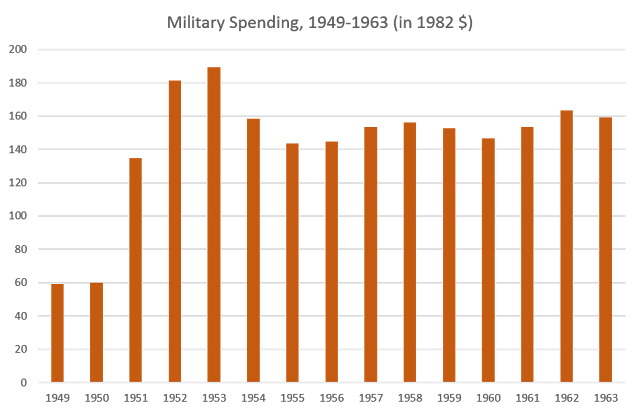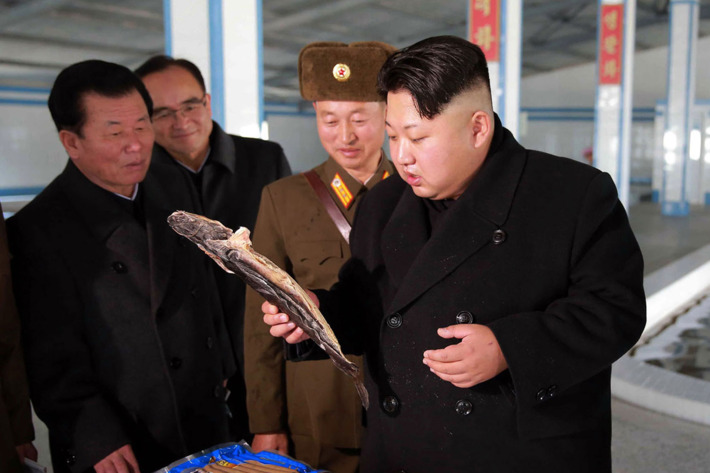When the US government decides it doesn’t like a foreign regime, it’s become something of a tradition for US politicians — with the help of a compliant media — to portray those leaders as irrational, unhinged, or even downright insane.
This was true of Saddam Hussein, and it was true of Slobodan Milosevic. In both cases, a foreign head of state was condemned as irrational in order to help justify US invasions and bombings of foreign nations that were no threat to the United States.
The US narrative usually goes something like this — as described by Ronnie Lipschutz:
Why would so-called rogues — and these are the only countries that, according to Washington, threaten US forces, allies, or interests — choose to [threaten the US]? No rational reason can be given, and so irrational ones are offered instead. They hate us, but for no reason since we have no designs on them. They desire vengeance, but for no reason since we have never offended them. They wish to injure us, for for no reason, since they have only been injured through their interference with our pusuit of order.
This narrative helps to reinforce the credulous American public’s naive acceptance of the idea that the US government is an untrammeled force for good in the international sphere, and that any opposition to the US must be based on irrational, evil motives.1 If any other head of state is angry with the United States, it’s simply because he absurdly desires world conquest, or to massacre innocents. Or he may even be insane.
Why We Must Claim They’re Crazy
But there’s an even more important motivation behind portraying “rogue” nations as being run by crazy people. It allows advocates for war to claim that deterrence via America’s huge nuclear and conventional arsenals will not work — and thus these leaders present a grave threat to the American public. Lipschutz notes: “if insanity or irrationality are to blame for wars, deterrence cannot work to prevent them.”
A rational head of state, of course, would understand that any existential threat to the US could mean total nuclear annihilation for the offender. On the other hand, if the head of state is just insane, then all bets are off.
It is not surprising, then, that this narrative is being trotted out yet again in the case of North Korea.
Nuclear deterrence may have worked against Joseph Stalin — who apparently was a super-reasonable and level-headed guy — but Kim Jong-un is just crazy.
Naturally, ultra-hawk John McCain has been at the forefront of this rhetorical effort, calling Kim Jong-un a “crazy fat kid.” Later, McCain’s daughter got in on the act, calling Kim a “total absolute maniac.”
These attempts at portraying Kim as immune to deterrence are so common, in fact, that Isaac Fish from Foreign Policy magazine has declared “there is widespread belief in the US that North Korea is so hard to deal with because Kim is insane.” Fish, on the other hand, concludes Kim has understandable motives just like most everyone else.
Certainly, in social media, it’s not uncommon to encounter pro-war commenters who insist — without proffering any evidence — that Kim is simply impervious to nuclear deterrence, and thus must be killed (along with millions of other North Koreans) in a pre-emptive nuclear holocaust.
Kim is Sane — and Predictable
Those who have actually bothered to study Kim and his regime, however, often take a rather more moderate position.
Charles Peña begins with the obvious question and provides the obvious answer: “But isn’t Kim Jong-un an unpredictable—even crazy—leader who can’t be deterred? The same was said of Stalin and Mao in their time, yet both those leaders were deterred. Moreover, Kim Jong-un would have to be suicidal to launch a nuclear weapon against the United States since the United States has the ability to retaliate with utter devastation.”
David C. Kang also concludes: “Kim Jong-un may be many things, but he is not suicidal. Deterrence will continue to work.”
Contrary to the idea that Kim and the North Koreans are crazed loose cannons, the North Koreans behave exactly as any other regime bent on maintaining its regime. Far from seeking to die in a blaze of glory, Kim wants to go on living as a dictator indefinitely.
As Peña notes, Kim wants “to secure his own survival and that of his regime, much like his father and his father’s father before him. That would certainly explain the executions and assassinations of those who might usurp him, which include family members.”
The regime wants to survive — and not be a victim of “regime change” which is exactly why, as Kang writes, “North Korea isn’t unpredictable; rather, it is the most predictable country on earth.”
Even Secretary of State Rex Tillerson — perhaps the most reasonable person on Trump’s foreign policy team — admits “He may be ruthless. He may be a murderer. He may be someone who in many respects we would say by our standards is irrational. But he is not insane.”
It’s Rational to Want Nuclear Weapons
But why would the regime want nuclear weapons if not to use them? Kim wants nukes as protection against “regime change” imposed by the US, since, as Pena notes, “Having nuclear weapons would seem to be an effective deterrent against regime change. After all, other dictatorial leaders who gave up their weapons programs—such as Iraq’s Saddam Hussein and Libya’s Muammar el-Qaddafi—paid a high price for those decisions.”
Jacob Hornberger has explained how Fidel Castro was one of the first to figure out the need for nuclear weapons as protection against American-sponsored regime change: “[Cuba’s success in the Cuban Missile Crisis] showed that if an independent, recalcitrant Third World regime wants to protect itself from a US national-security-state regime-change operation, the best thing it can do is secure nuclear weapons.”
Thus, North Korea’s behavior in this regard has been utterly predictable, rational, and what we would expect from a head of state in his position.
Kim understands nuclear deterrence perfectly well. He knows that it is the only thing that works against the US’s plans for yet another regime change operation.
However, in order to justify a first-strike nuclear war or a pre-emptive war against the North Koreans, the John McCains of the world must convince the world that Kim is simply insane and is not subject to deterrence.
North Korea Is Not Unique
This “he’s crazy!” strategy is then mixed with endless ominous news reports about what new missile Kim’s regime is testing this week, and just how many nuclear warheads he may or may not have. Indeed, the evidence is rather spotty in this regard. For the sake of argument, however, let’s assume that the regime has nuclear warheads, and it has the ability to deliver them to the North American mainland.
Okay, well, then it’s a good thing nuclear deterrence works. After all, we know for sure that the Chinese regime has many nukes, and the ability to deliver them. In fact, the Chinese have had nuclear capability for decades, and will continue to have it.
While Russia and the US both have more than 7,000 warheads and enough nuclear firepower to destroy the planet many times over, the French have 300 warheads, and China has 260 warheads.

Source: ICAN and the Arms Control Association.
Why the Silence about Chinese Nuclear Capabilities?
Moreover, it was just last month that China rolled out new ICBMs, including the DF-31AG, which puts most of the North American mainland within reach — and undoubtedly with far greater precision and reliability than anything the North Koreans have. And yet, all we heard about in the news was about North Korea’s low-rent, often-failing missile system.
So, the Chinese can almost certainly deliver multiple nuclear warheads to North America. So why aren’t we talking about a pre-emptive strike on Beijing? Why not strike now before the Chinese strike us? Is it just because the Chinese leadership — a faceless entity headed by people whom virtually no American can name — is so eminently sane? The Chinese heads of state are almost certainly sane, but unlike the North Koreans — and like the Americans — they seek expansion. This can be seen in the continued shows of strength by the Chinese state in the South China Sea and elsewhere. So why not talk about a war to stop this quest for global dominance?2
In all likelihood, few talk about pre-emptive war on China precisely because it is known that a war against China would be an unmitigated global disaster. North Korea is small enough that the US military establishment can still flatter itself with the idea that it can pull off yet another regime change without having to face a real nuclear arsenal such as that held by China. Sure, Seoul might be totally destroyed, but that is a price the Pentagon is willing to pay.
Indeed, the vast nuclear capability of the Chinese, not to mention Pakistan’s growing ICBM capability, illustrates the absurdity of the claim that any country that has nuclear weapons is about to use them on the US, and thus requires a pre-emptive war.
Yes, North Korea is currently involved in efforts to expand its ICBM capability. But we’re only hearing about it because China, Russia, and others already have the capability. They don’t have to fire test missiles into the ocean. They can already nuke North America, and everyone who’s paying attention knows it. We’ve already been down this road with the the Russians, the Chinese, the Indians, the Pakistanis, and others.
What to Do
So what is a reasonable response to nuclear proliferation? President Dwight Eisenhower can offer some useful insights here.
The Soviet Union conducted its first successful nuclear tests in 1949. By the early 1950s, the Soviets were testing air-dropped bombs — which made sense for a country with a sizable air force. By 1956, the Soviets were testing medium-range ballistic missiles.
What did Eisenhower do? Did he threaten a pre-emptive war with the Soviets? Did he massively increase military spending?

Source: “US Military Spending in the Cold War Era” by Robert Higgs
No. In fact, during the early fifties, Eisenhower cut military spending, and by the end of Eisenhower’s term, military spending had still not matched the levels built up by Harry Truman during the Korean war. This all occurred while the Soviets expanded their nuclear capability.
Naturally, if Eisenhower were president today, he’d be denounced by neoconservatives as a Russian tool and a traitor for both his military budget-cutting and his reliance on nuclear deterrence. Fortunately for Eisenhower, however, Lindsay Graham and John McCain were not yet in the Senate.
The larger point, of course, is that Eisenhower understood that nuclear deterrence works, and that, while it is an unfortunate option in a nuclear-armed world where much is beyond the control of the US military — it is the most reasonable and low-risk option.
Unfortunately, the current US regime is practicing what looks like the opposite approach.
With his constant “tough talk” about invading or attacking North Korea, Trump and his aides are courting the type of situation that leads to actual nuclear war. After all, North Korea has to only believethat the country is about to be invaded and the regime annihilated. Constant threats of invasion are just the sort of things that lead to misunderstandings, human error, miscalculation, and disastrous wars.
Moreover, its unclear that Trump is taking seriously the possibility that China could act to defend the North Korean regime from destruction. As John Mearshimer recently noted, the Chinese regime views North Korea as an essential buffer state against Western encirclement. The Chinese regime is unlikely to sit around and do nothing while the US adds North Korea to its list of Asian client states.
On the other hand, why talk about any of this when it all can be be dismissed with a wave of the hand, and one need only declare “they’re crazy!” In that case, the possibility of World War III with China and others need not even be weighed. If Kim is “crazy” then prudence dictates we must “do something” before his suicidal insanity takes over and he nukes San Francisco.
The “he’s crazy!” claim thus acts as a magical talisman of warhawks who can denounce all caution and strategic concern that speaks against “taking out” the bad guy who will bomb us any second.
It’s easy to see why John McCain is so fond of the tactic.
Reprinted with permission of the Mises Institute.
- 1. This devotion to the idea of American innocence in a dangerous world is so common, that it is the central point of discussion in Reinhold Niebuhr’s seminal book on foreign policy The Irony of American History. Americans, Niebuhr writes, cling to the idea that human imperfection — an idea captured in the now passe idea of “original sin” — is reserved only for foreigners and other misfits. Americans, on the other hand, are moving ever upward toward worldy perfection.
- 2. Contrary to US talking points, of course, the Chinese are no where near seeking global dominance. They are seeking regional hegemony and continued growth in strategic buffers against American aggression.















